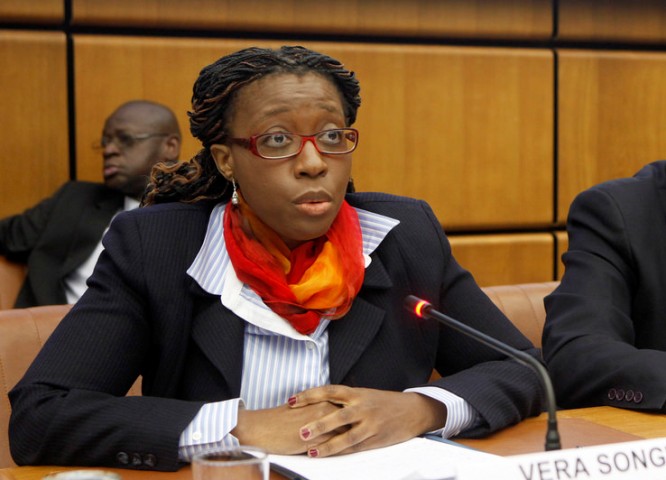Africa may reach to 600 million mobile subscribers with digital health platform
ACIP is a mobile-based tool for two-way information and communication between citizens and governments.

- Country:
- Ethiopia
“With this platform, we have the possibility of reaching between 600 million and 800 million mobile subscribers in Africa,” said Vera Songwe, Executive Secretary of the Economic Commission for Africa (ECA), during the virtual launch of the Africa Communication and Information Platform for Health and Economic Action (ACIP) on 23 June 2020.
ACIP is a mobile-based tool for two-way information and communication between citizens and governments. It furnishes national and regional COVID task forces with user-generated survey data and actionable health and economic insights that will enable authorities to better analyze pandemic-related problems and implement appropriate responses.
Dr John Nkengasong, Director of Africa CDC said the platform offers a “unique opportunity to change the way we conduct disease surveillance, enhance our ability to acquire good and timely data, and make all Africans count.”
The launch was presided over by President Denis Sassou Nguesso of the Republic of Congo who lauded the initiative and noted that it “responds to member states' requests for assistance in collecting and processing essential data to respond effectively to COVID-19”.
President Alpha Condé of Guinea pledged to “make sure that all 55 AU member states are part of this initiative (ACIP).” He said the uncertainties around COVID-19 make a strong case for Africa to speedily embrace the fourth industrial revolution, ensuring better internet access and affordability.
Ms Songwe deplored the state and high cost of Internet access in Africa stating, “In an era of pandemic and economic crisis, it’s even more difficult for people to spend the little resources they have to pay for access.”
The good news, however, is that while the ECA is working with key stakeholders to solve the problem of internet access, reliability, and cost, the ACIP can already reach over 80% of Africa’s mobile users without adding the burden of cost on them.
“We, as operators, can waive the charges for USSD because chances are that many people battling the pandemic in some rural areas may not have airtime,” said Robert Shuter, CEO of MTN. He said the uniqueness of the ACIP initiative got MTN and its “competitors to agree that this was an area for collaboration and cooperation.”
Mr Shuter said the technology can be used on any handset and on any device and that the platform “presents a very simple menu to users and enables us to collect very important information that policymakers can use to identify where the issues and hotspots are.”
The launch was also attended by African ministers in charge of ICT who urged stakeholders to ensure that there were synergies between the ACIP and efforts being made in the area of digital technology to combat COVID-19 at national levels.
ITU’s Secretary-General, Houlin Zhao, called on African regulators and ICT ministers to “back this new platform.” He said artificial intelligence and big data are at the heart of the ACIP and that the support of telecommunication regulators from each country is “absolutely needed.”
Thirty-six African member states are already part of the initiative. The platform will also allow COVID-taskforces to deploy health and economic resources to mitigate the pandemic’s impact.
Boutheina Guermazi who heads the World Bank’s Digital Development Global Practice said she was heartened to see “the speed with which Africa reacted to create this platform,” bringing together major stakeholders on the continent to take advantage of mobile big data analytics.
“We know that accurate and up-to-date information on aggregated anonymised mobility patterns could clearly be used for monitoring, predicting outbreaks, and planning future activities,” she said.
Lacina Kone, CEO Smart Africa described the ACIP as “one of the digital initiatives we believe will transform Africa.” He praised the ECA for its role in bringing together Africa’s major mobile operators, regulators, and governments on a single platform.
“The year 2020 should be a year we embrace and accelerate collaboration through digital transformation. It should go down in history as a technological, health and economic turning point for Africa,” said Mr Kone.
Ms Songwe urged Africa’s youth to “work with us” to design artificial intelligence systems and platforms that can be curated to get better data and help identify and “ensure that the informal sector becomes part and parcel of an active economic tissue of our continent.”
She thanked the ITU, Smart Africa, the African Union, the World Bank, WHO, MTN, Orange, Safaricom, Vodacom, Airtel, and all stakeholders for contributing to the project.
(With Inputs from APO)
ALSO READ
States Sue Over Sudden COVID-19 Grant Cuts
Pakistan's Former President Zardari in Isolation Following COVID-19 Diagnosis
Uncovering COVID-19 Procurement Scandals: Interim Report Reveals Shocking Details
Army's COVID-19 Vaccine Policy Reversal Sparks Reenlistment Surge
Justice Served: Life Sentence in COVID-19 Ambulance Rape Case










